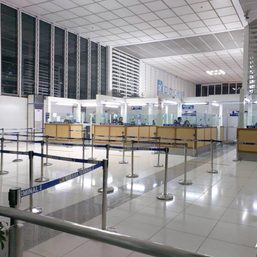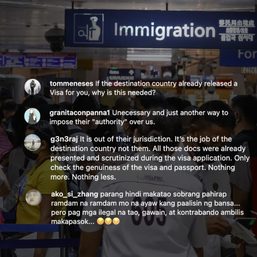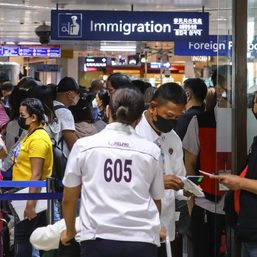SUMMARY
This is AI generated summarization, which may have errors. For context, always refer to the full article.
![[OPINION] My take on color privilege](https://www.rappler.com/tachyon/2020/12/ispeak-2.jpg)
The ever-pervasive “Black Lives Matter” and the corollary “white privilege” – phrases which have been thrust into our consciousness – make me think of how I lived them.
I have not experienced such egregious abuse that I can recall, as a “different” color in this country. But I have noted through my many years that there are many colors of the skin, and of the mind, and many shades within that color, and beyond that there are hierarchies defined by rounder eyes, or nice wavy hair, or taller noses. And the manifestations of prejudice are learned from families and friends and societies, which range from raw physical and verbal abuse to the subtle psychological ones, such as the display of superior material means.
For all the good and bad things in me, I am a product as well of such influences.
Memories of a Philippine girlhood
I remember during my childhood that there was such a caste system of sorts, imposed by our previous colonial masters of the Spanish era. The Spanish “masters” were with us for about 300 years. Even at that time, the Spanish born in Spain were regarded more highly than the Spanish born in the Philippines, who were at the time called Filipinos. And the now-Filipinos were called indios. Many cynics have questioned why we need to look down on someone for validation.
When I refer to the white privilege of my time, I think of the Spanish elitist class represented by people around us, like some neighbors who were mestizos (Kastila). There was a sprinkling of them in our school. They had the Caucasian features which were ideal in our time, and they always spoke Spanish and were not too easily engaging with the rest of us. We went to the same convent school as it was within our means, but my Spanish neighbors were transported in chauffeur-driven cars, and I in a hired jeepney with other less favored ones. But we accepted it. It just stays in my memory.
And when circumstances deemed it, we communicated in English, as they were proud of not speaking Tagalog. Speaking Spanish was more high-class than speaking Tagalog, or even English. During the Spanish colonial era, only chosen scholars of that time were sent to Spain to be educated. Even my grandmother, whom I had never had the privilege of knowing (as she had passed away before I was born) carried with her the airs of her Spanish forebears according to my mother and aunts, and often lamented about American influence on our shores disturbing her social and cultural mindset. Looking at the streets in her neighborhood, she quipped, “Nowadays, anyone (during the American era) can ride a car, whereas before, one would know the better class of people who had access to more expensive transport.”
Language was an indication of class, and my mother and her sisters were proud that they spoke Spanish at home. This continued in spite of unfortunate hard times, which prompted some neighbors to mock them for living high by speaking the language of the privileged.
In terms of looks, maganda (attractive) often equated to mestizada (mixed white, high nose), maputi (white), and matangkad (tall), a more occidental criteria of sorts.
Micro-prejudices
None from our generation in my family had much of that coveted Western physiognomy, and in fact, we looked more Chinese (from our grandfather) and Malay (from my father’s side). I remember hating looking more Chinese than whatever was more desirable, listening to insidious aggressions from my peers like, “Singkit ka (your eyes are slanted), so you must be Chinese.” Although this statement can be a simple, declarative fact, children know how to cut into you with an uncomplimentary adjective.
On the other hand, my mother had a tall nose (matangos), but most of us kids did not inherit that finer protruberance. I remember complaining to my mother about looking Chinese, and she once said that I should not take offense, as the Chinese had the oldest civilization and I belonged to an ancient revered culture. True, but I could not appreciate this at the time when I just wanted to look like everyone.
Caste system, amo vs katulong (master vs helper)
Ever since then, I often asked myself: did I ever exhibit privilege or arrogance over darker individuals? Are we guilty of employing poorer fellow citizens who, by virtue of both genetics and occupation, are darker? Eventually, their children and grandchildren would also come to work in our household, like a serving dynasty of sorts.
I justified my good girl guilt by thinking that the servants who worked for us were luckier than those who had no chances of working and coming to the big city. They had, I am sure, in turn, felt some form of superiority over even poorer or darker ones.
Mestizo migrants
When I got to the US I slowly got rid of my colonial hangups. I got a job which took me to the far reaches of many worlds, where I saw blonde children with blue eyes in the poorer Amazon belts, barefoot and dirty because of non-access to good hygiene and health services.
The overwhelming presence of migrants here in the US, welcome and unwelcome – including Hispanics, many of whom had escaped oppression, abuse, and poverty – also stained the magic represented by our once colonial forebears, even if they all spoke Spanish, had tall noses, and rounder eyes.
As I grew older I learned to temper my complexes regarding the privilege of color.
I have come to realize that our English speaking ability has given us an edge in this country. For a lot of our fellowmen, other worlds have opened up, some at home (for example, many are hired at call centers due to their ease in speaking English), as well as overseas, giving them a leg up in earning power and an improved material way of life.
An important leveler
Much as I hate colonial influences on ordinary people’s lives, I am grateful for the universal education which was instituted in our country. More than any other variable, education impacts opportunity and facilitates upper mobility, eventually giving us the chance to alter definitions of human value.
I love New York?
I spent close to 30 years living and working in New York, and with the United Nations. I guess when I say I love New York, I mean my life in New York when everyone was struggling to find a job, pay rent, and adapt within a social structure. I was lucky that I found a job with the UN, where most of the general service workers, where I started, came from different countries and were of many colors. I worked with Japanese, Canadians, Norwegians, French, and South Americans, who at one point or other were our bosses and subordinates.
I lived in a world where there were no hierarchies other than the grades and ranks that were part of the structure, but which were all attainable. There may be other experiences, but I only speak of mine. So, everyone was different but the struggles were similar. I was lucky as well in that the push towards gender equality gave me a better chance to move upwards. The colors have blurred.
After all these
Now that I am older, I am at peace with myself at most times. However, I still find myself pushing beyond old complexes. Recently, ill treatment of others for accidents of skin color, language, accents, and education still become significant variables in how one is treated in everyday life. – Rappler.com
Gia R. Mendoza is one of the first graduates of UP Journalism. She worked with UNICEF for decades and now lives in Florida.
Add a comment
How does this make you feel?
![[OPINION] Anti-Black attitudes among Filipinos, in the context of the U.S. Empire](https://www.rappler.com/tachyon/2020/09/ispeak-640_5C45D3B3DBF8421F913418953B78A4DD.jpg?fit=449%2C360)











![[Just Saying] Reasons the new travel regulations are flawed](https://www.rappler.com/tachyon/2023/08/TL-travel-regulations-August-31-2023.jpg?resize=257%2C257&crop=281px%2C0px%2C720px%2C720px)



There are no comments yet. Add your comment to start the conversation.